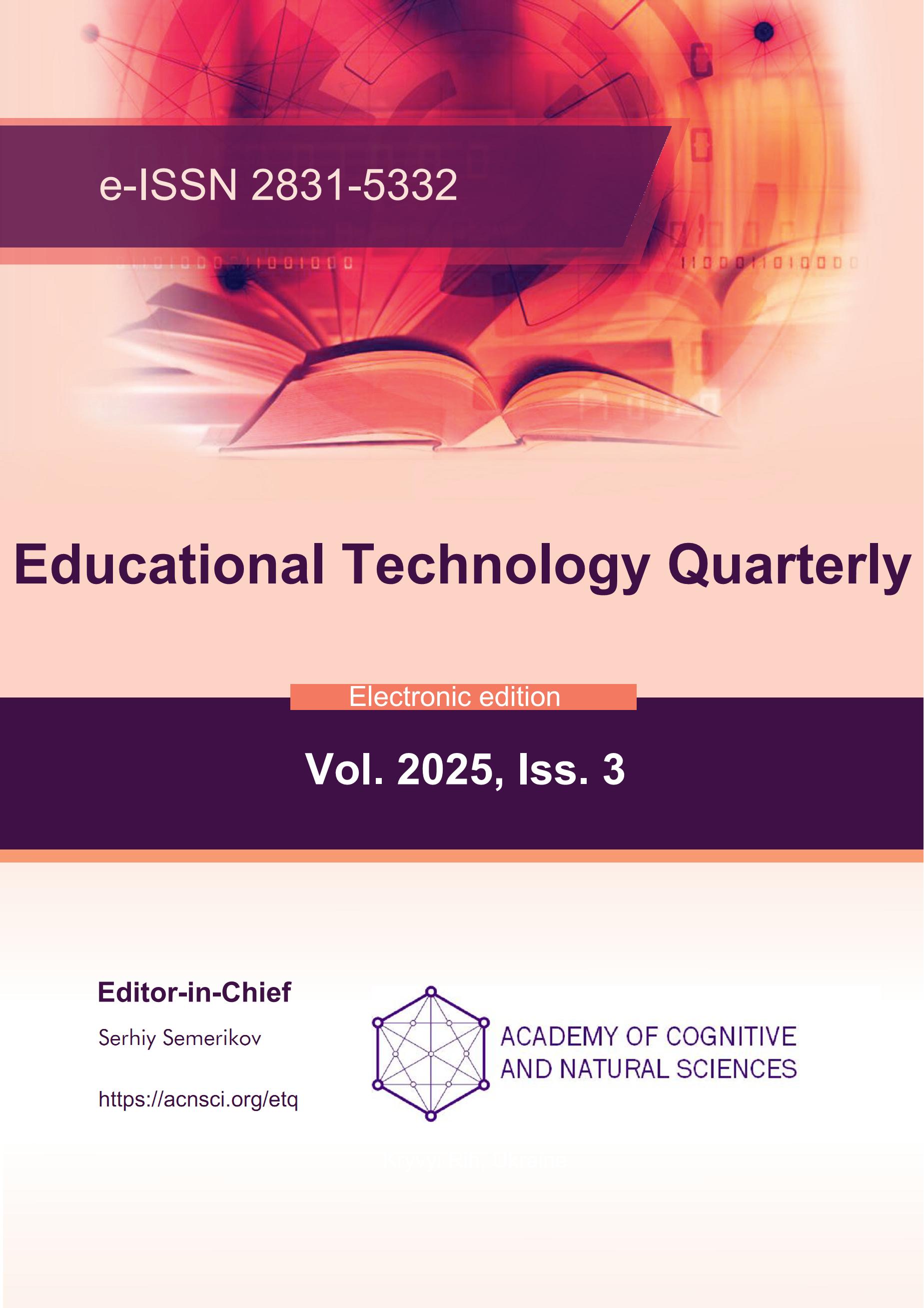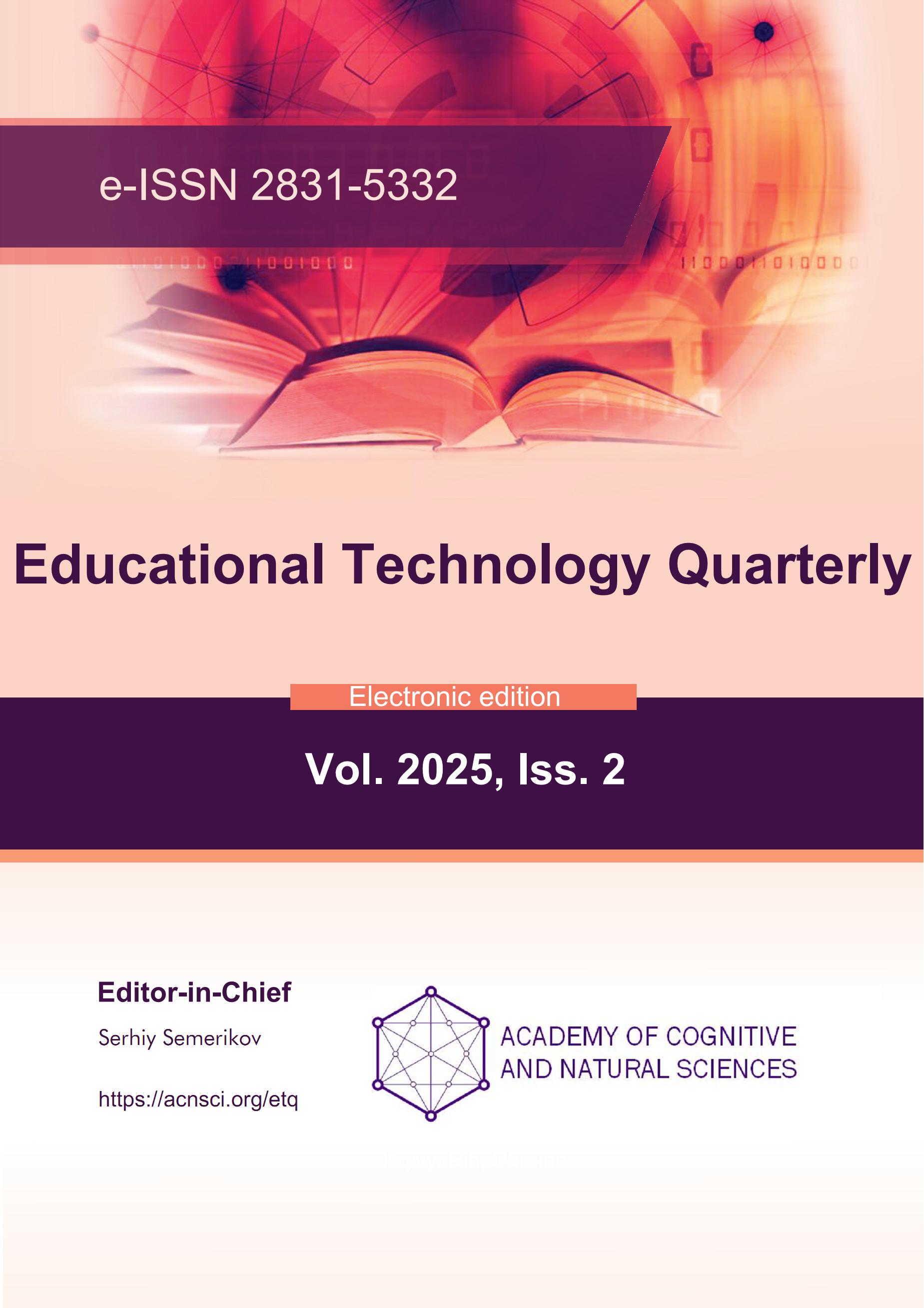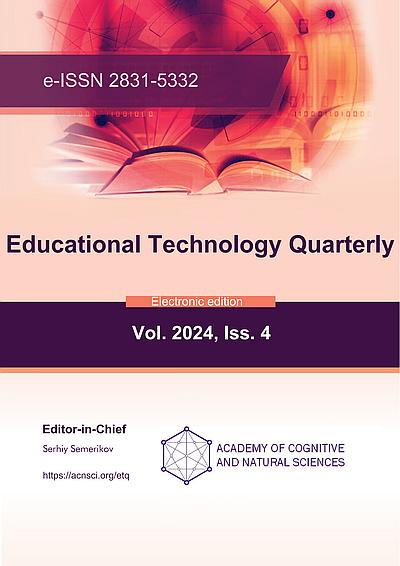Archives
-

Early Access
Early Access articles are peer-reviewed, accepted articles to be published in this publication (articles in press). When the final article is assigned to volumes/issues of the publication, the early access version will be removed, and the final version will appear in the associated published volumes/issues. The date an article was first made available online will be carried over. Please be aware that although accepted papers in the press do not have all bibliographic details, they can already be cited using the DOI. -

Vol. 2025 No. 3 (2025)
In this issue:
- GenAI as scholarly ally: patterns, pedagogy, and policies in graduate writing research
- Digital leadership: shaping school effectiveness in the digital era - a meta-analysis
- The impact of undergraduate students' perceived social media empowerment in their engagement in sustainability practices: a predictive study
- Temporal patterns and educational use of smartphones among Algerian secondary learners
- Reading habits, digital fluency and academic achievement of secondary school students in a local government area in South West Nigeria
- Innovative approaches in teaching coding skills to young children: a scoping review
-

Vol. 2025 No. 2 (2025)
In this issue:
- Virtual collaboration in education: tool selection patterns for project-based learning in the context of group dynamics
- A global triangulation approach to ChatGPT integration in education
- Integrating AI in higher education: transforming teachers' roles in boosting student agency
- Enhancing inquiry-based learning skills with ICT to pre-service teachers in Tanzanian teacher colleges: constraints and mitigating strategies
- Mobile learning evolution: a decade of developments (2014-2023)
- Belief in building a full-fledged distance learning course in athletic training
-

Vol. 2025 No. 1 (2025)
In this issue:
- A proposed framework for achieving higher levels of outcome-based learning using generative AI in education
- State of the art approaches to the quality of distance education
- Evolution of digital competence development for mathematics educators in technical universities: a contemporary framework
- Assessing the role of online mathematics tools in enhancing student learning and engagement
- Students experiences and motivational factors on using e-learning systems in higher education institutions in Tanzania
- A bibliometric analysis on the effects of digital media among children in the time of COVID-19 pandemic
-

Vol. 2024 No. 4 (2024)
In this issue:
- Artificial intelligence in teaching social disciplines: Opportunities and challenges of tools
- Assessment of lecturers' awareness of artificial intelligence for education in a Nigerian university
- Exploring the impact of device ownership, usage patterns, and technology proficiency on mobile learning among higher education students: a multi-faceted study
- The impact of smart classrooms on the core literacy of college English learners and the relationship between core literacy and learning outcomes: Evidence from China
- Tutors' perspectives on the integration of information and communication technology in early-grade teacher colleges in Tanzania
- Advancing autonomy in Tunisian higher education: Exploring the role of technology in empowering learners
-

Vol. 2024 No. 3 (2024)
In this issue:
- Integrating online and offline teaching to promote creativity for STEM learners
- Personalised learning and artificial intelligence in science education: current state and future perspectives
- Understanding stakeholders' perception on integrating ICT in teaching and learning science subjects: Experiences from Tanzanian secondary schools
- Applying the UNESCO ICT competency framework to evaluate digital competencies among undergraduate students in teacher education in Tanzania
- Exploring structural equations modelling on the use of modified UTAUT model for evaluating online learning
- Empowering virtual collaboration: harnessing AI for enhanced teamwork in higher education
-

Vol. 2024 No. 2 (2024)
In this issue:
- Algerian secondary school students' preferences for the use of YouTube in their informal learning
- Teachers' technological literacy for ICT integration to implement competence-based curriculum in public secondary schools in Tanzania
- Is virtual learning still virtually satisfactory in the post-COVID-19 era for pre-service teachers?
- Management practices in the implementation of police curriculum through blended learning
- Implementing communication technologies to enhance learning efficiency at a technical vocational education and training college in Cape Town
- Adoption and use of MOOCs by undergraduates in selected universities in Ibadan, Nigeria
-

Vol. 2024 No. 1 (2024)
In this issue:
- Implementing media educational technology in Ukrainian preschool institutions
- Context-relevant strategies for ICT integration in teaching and learning science subjects in Tanzania secondary schools
- Pedagogical approach of grade 7 teachers in teaching the learning competency of integers
- Physics on autopilot: exploring the use of an AI assistant for independent problem-solving practice
- Technological literacy in using Learning Management System among students in higher education institutions Tanzania: the case of two selected universities
- Learning styles of the Armed Forces of Ukraine personnel undergoing English language courses
-

Vol. 2023 No. 4 (2023)
In this issue:
- Challenges facing distance learning during martial law: results of a survey of Ukrainian students
- Lived experiences of teachers and students in distance education: shift from traditional to online learning
- Methodological approach for developing online courses: a case study
- Mining student coding behaviors in a programming MOOC: there are no actionable learner stereotypes
- Project-based learning as an approach to enhance ecological component in professional education
- Enhancing descriptive writing of secondary school students through digital lesson contents in Zanzibar
-

Vol. 2023 No. 3 (2023)
In this issue:
- A methodology for flipped learning in a cloud-oriented environment: enhancing future IT specialists' training
- Computer-oriented management of students' educational activity in informatics practicum
- Mobility in the information society: a holistic model
- Approaches to mass communication educational researches in universities and polytechnics of Nigeria
- Adaptive learning: a cluster-based literature review (2011-2022)
- Gamification implementation for educational purposes: a scoping review (2013-2018)
-

Vol. 2023 No. 2 (2023)
In this issue:
- Teachers' technological competencies in enhancing teaching and learning in secondary schools in Tanzania
- Web-oriented encyclopedic edition as a tool for dissemination of verified knowledge in the field of education
- Unveiling the potential of structural equation modelling in educational research: a comparative analysis of Ukrainian teachers' self-efficacy
- Exploring usability principles for educational online courses: a case study on an open platform for online education
- Enhancing student research activities through virtual chemical laboratories: a case study on the topic of Solutions
- Harnessing personal smart tools for enhanced STEM education: exploring IoT integration
-

Vol. 2023 No. 1 (2023)
In this issue:
- Digitalization of vocational education under crisis conditions
- Impact of digital disruption influencing business continuity in UAE higher education
- A meta-analysis of the most influential factors of the virtual reality in education for the health and efficiency of students' activity
- Cloud technologies of augmented reality as a means of supporting educational and research activities in chemistry for 11th grade students
- Mobile application for advertising faculty educational services
- The use of massive open online courses in teaching the fundamentals of programming to software engineers
-

Augmented Reality in Education
Vol. 2022 No. 4 (2022)In this issue:
- Using mobile applications with augmented reality elements in the self-study process of prospective translators
- Using immersive reality technologies to increase a physical education teacher's health-preserving competency
- Examining the potential of augmented reality in the study of Computer Science at school
- Comparison of Google Lens recognition performance with other plant recognition systems
- Development of an augmented reality mobile physics application to study electric circuits
- Implementation of digital technology for student involvement based on a 3D quest game for career guidance and assessing students' digital competences
-

Vol. 2022 No. 3 (2022)
In this issue:
- Retraction of published article due to the author's proposal, Vol. 2021, Iss. 3, pp. 375-387
- Virtual learning environments: major trends in the use of modern digital technologies in higher education institutions
- Creating a cloud-based translator training environment using Memsource
- Practical application of systemizing expedition research results in the form of taxonomy
- The current level of competence of schoolteachers on how to use cloud technologies in the educational process during COVID-19
- Adapting to teaching restrictions during the COVID-19 pandemic in Japanese universities
-

Vol. 2022 No. 2 (2022)
In this issue:
- Approaches on the augmented reality application in Japanese language learning for future language teachers
- Gamification as a trend in organizing professional education of sociologists in the context of distance learning: analysis of practices
- Personal indicators of occupational stress of employees working remotely in a pandemic quarantine
- Methodology of monitoring negative psychological influences in online media
- System for digital professional development of university teachers
- Synchronization competencies provided by traditional educational system with real-life required competencies in conditions of digital sociality
-

Vol. 2022 No. 1 (2022)
In this issue:
- Distance course examination
- Hackathons in computer science education: monitoring and evaluation of programming projects
- Features of responsibility of future specialists of the socionomic professions as an indicator of their digital competence
- Teachers' training for the use of digital tools of the formative assessment in the implementation of the concept of the New Ukrainian School
- The experience of designing a single information and educational environment of the university "NMU Digital"
- Ergonomic aspects of computer-oriented pedagogical technologies implementation in teaching foreign languages to students of higher education institutions
-

Vol. 2021 No. 4 (2021)
In this issue:
- 1st Symposium on Advances in Educational Technology: Outlook
- The practice of developing the academic cloud using the Proxmox VE platform
- Selection of ICT tools for the development of high school students' research competencies in specialized chemistry training
- Application of cloud computing in the process of professional training of physics teachers
- Digital storytelling in adult education: barriers and ways to overcome them
- Design features of the synthetic learning environment
-

Vol. 2021 No. 3 (2021)
In this issue:
- Educational direction of STEM in the system of realization of blended teaching of physics
- The early history of computer-assisted mathematics instruction for engineering students in the United States: 1965-1989
- Features of learning motivation in the conditions of coronavirus pandemic (COVID-19)
- Formation of digital competence of CS bachelors in the use of cloud-based learning environments
- Selecting tools to enhance scholarly communication through the life cycle of scientific research
- Interactive methods in blended learning of the fundamentals of UI/UX design by pre-service specialists
-

Vol. 2021 No. 2 (2021)
In this issue:
- XII International Conference on Mathematics, Science and Technology Education: conference report
- Structural model of a cloud-based learning environment for bachelors in software engineering
- Students' computer-based workshops in mandatory classes of English for students majoring in psychology and linguistics: A comparative experimental study
- Digital transformation as the main condition for the development of modern higher education
- Using web technologies in the process of development of students' critical thinking
- Methodical preparation as a means of developing prospective mathematics teachers' ICT competency
-

Vol. 2021 No. 1 (2021)
In this issue:
- Educational Technology Quarterly: in the beginning
- From the experience of organizing artistic and productive activities of older preschool children by means of distance education in the conditions of quarantine measures for the spread of COVID-19
- Criteria for selecting open web-oriented technologies for teaching the basics of programming to future software engineers
- Analysis of e-resources for the specialist's rhetorical culture development
- Training of future primary school teacher for use digital educational resources in their professional activities
- Use of digital tools as a component of STEM education ecosystem




